Intel Core i7-11700K Review: Blasting Off with Rocket Lake
by Dr. Ian Cutress on March 5, 2021 4:30 PM EST- Posted in
- CPUs
- Intel
- 14nm
- Xe-LP
- Rocket Lake
- Cypress Cove
- i7-11700K
Gaming Tests: Deus Ex Mankind Divided
Deus Ex is a franchise with a wide level of popularity. Despite the Deus Ex: Mankind Divided (DEMD) version being released in 2016, it has often been heralded as a game that taxes the CPU. It uses the Dawn Engine to create a very complex first-person action game with science-fiction based weapons and interfaces. The game combines first-person, stealth, and role-playing elements, with the game set in Prague, dealing with themes of transhumanism, conspiracy theories, and a cyberpunk future. The game allows the player to select their own path (stealth, gun-toting maniac) and offers multiple solutions to its puzzles.
DEMD has an in-game benchmark, an on-rails look around an environment showcasing some of the game’s most stunning effects, such as lighting, texturing, and others. Even in 2020, it’s still an impressive graphical showcase when everything is jumped up to the max. For this title, we are testing the following resolutions:
- 600p Low, 1440p Low, 4K Low, 1080p Max
The benchmark runs for about 90 seconds. We do as many runs within 10 minutes per resolution/setting combination, and then take averages and percentiles.
| AnandTech | Low Resolution Low Quality |
Medium Resolution Low Quality |
High Resolution Low Quality |
Medium Resolution Max Quality |
| Average FPS | 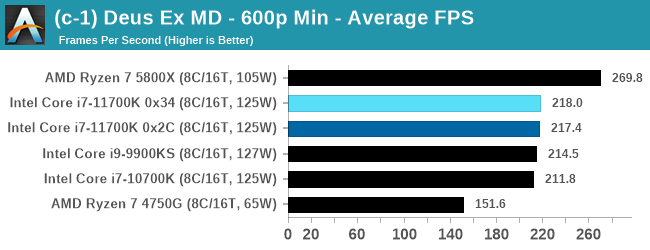 |
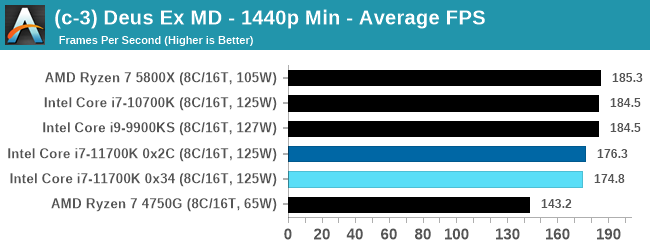 |
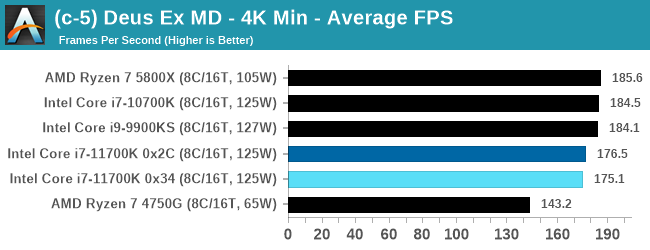 |
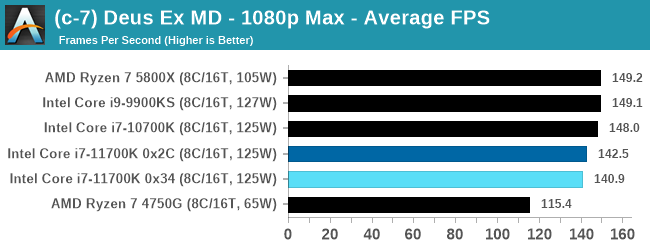 |
| 95th Percentile | 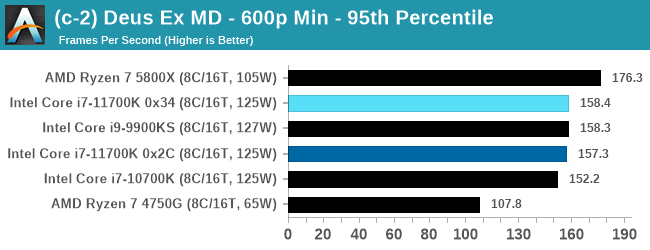 |
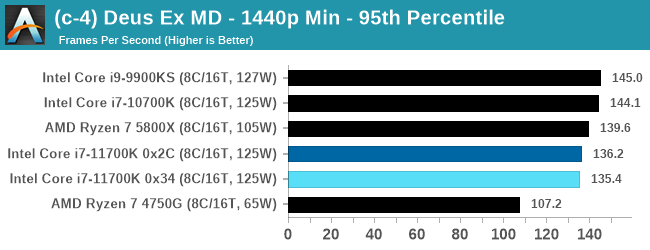 |
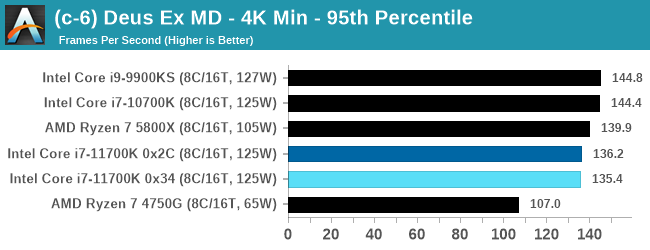 |
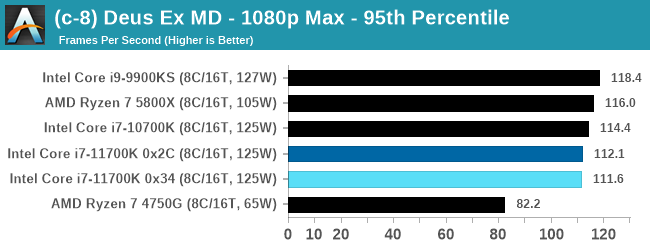 |
DEMD is often considered a CPU-limited title, so when the 11700K is better than the older Intel CPUs is at the low resolution, low quality setting, that confirms that. But as we ramp up the resolution, and the quality, the 11700K falls behind ever so slightly in both averages and percentiles.
All of our benchmark results can also be found in our benchmark engine, Bench.












541 Comments
View All Comments
TheinsanegamerN - Monday, March 8, 2021 - link
They're the same chip, the only difference is clock speeds. Dont get your hopes up, RKL is a total dud, much like Williamette was.Samus - Saturday, March 6, 2021 - link
blppt - my concern is that AMD may have a superior IPC, but the real fruit comes from the manufacturing process. Intel is still (somewhat) competitive at 14nm and that in itself is quite unbelievable. Imagine where this chip would be on 7nm or 10nm, at 6GHz+ and more cores with 2-3x the cache.That said, this victory may be short lived because AMD is basically taking advantage of the embarrassing execution Intel has repeated, much like they did 20 years ago with the P4 (albeit that was an architecture failure, not a manufacturing process failure)
Thesubtlesnake - Saturday, March 6, 2021 - link
Intel's latest 10nm process delivers *slower* clocks than its 14nm one. So, no, 6 GHz is not on the table. I imagine that when the transition to 7nm, Intel will be able to achieve moderately faster clock speeds than with 14nm.Otritus - Sunday, March 14, 2021 - link
10nm SF is good enough for 5 GHz. 10nm ESF can clock higher, so Intel's latest (but unreleased) process should match 14nm. I would not expect 7nm to clock higher than 14nm because it is becoming very clear that 5Ghz+ is just a waste of power and transistors, so i would not expect 7nm architectures to be designed to clock higher. We either are getting lots of IPC or just over 5GHz.Slash3 - Friday, March 5, 2021 - link
Mad lad.edved - Friday, March 5, 2021 - link
Nice write-up. Thank you.lucasdclopes - Friday, March 5, 2021 - link
Power efficiency is abysmal on this one.CiccioB - Friday, March 5, 2021 - link
No, it is not. It lower than AMD's efficiency, but it not that bad for being based on such an old process.PixyMisa - Friday, March 5, 2021 - link
So it's abysmal, but that's only to be expected?Spunjji - Saturday, March 6, 2021 - link
Not bad for an old process is still abysmal by the standards of 2021. No wonder Apple dropped them like a hot rock.